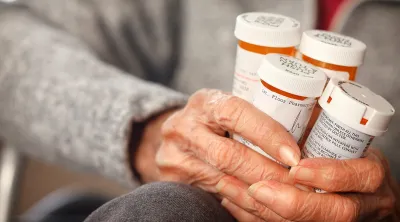Teaching ER docs safe prescribing for older adults

Each year in the United States, about 1 in every 250 Americans goes to a hospital emergency department because of an adverse drug event (ADE). Older adults are three times as likely as younger patients to come to the emergency department because of an ADE, which is an injury resulting from the use of a drug, such as a drug interaction, allergic reaction or overdose. Nationwide, ADEs send nearly 200,000 older adults to the emergency room
And often, it’s totally preventable, says Dr. Elizabeth Goldberg, associate professor of emergency medicine at the Warren Alpert Medical School of Brown University and an attending physician at Rhode Island Hospital and The Miriam Hospital in Providence, Rhode Island.
That’s why Goldberg is teaming up with Blue Cross & Blue Shield of Rhode Island (BCBSRI) to drastically reduce these types of events, which will help keep the state’s large population of older adults safer and reduce healthcare costs.
She submitted the winning idea at a recent BCBSRI Provider Medical Expense Trend Summit that invited the provider community to pitch programs that could help achieve the “triple aim:” better health, lower costs and a better patient experience.
“By inviting in doctors to help us solve problems, we’re doing more than just helping our own members,” says summit organizer Dr. Matt Collins, BCBSRI’s executive vice president and chief medical officer. Collins says that addressing the health and safety of older adults in Rhode Island will benefit the whole community and the healthcare system. In this case, he says, the pilot could potentially impact up to 30,000 residents.
Getting to the root of the problem
Goldberg says it might happen like this: after a recent visit, an older person returns to the ER with dizziness, confusion or a rash. Many things could cause those symptoms, says Goldberg. But then, as busy emergency physicians, “we prescribe another med to help the dizziness. But it turns out we should have stopped the medication that caused the problem in the first place, or avoided medications that are harmful to older patients from the get go.” What’s more, many older adults are already taking five or more medications, and, says Goldberg, “as you get older your kidney function declines,” which can make it difficult for the body to process the same kinds of doses – or even drugs – a younger body might.
Goldberg says it’s urgent to address the problem now. “Our population of older adults will double by 2050,” she says, and we have to understand more about how to take care of them.
Goldberg’s pitch: educate, change behaviors and measure progress
Goldberg pitched a model called EQUIPPED, short for Enhancing Quality of Prescribing Practices for Older Adults Discharged from the Emergency Department, which is intended to reduce the prescribing of potentially inappropriate medications that could cause side effects in older patients and lead to preventable healthcare use. The program has successfully reduced potentially harmful prescriptions for older adults by 20 to 50 percent at 11 Veterans Affairs and three civilian hospitals.
At the program’s core is a list of medications, says Goldberg, detailing “which meds to avoid in older adults.” Next is doctor education, and then regular feedback on their prescribing habits. A list of safe medications for common health conditions is also built into the electronic medical records system. There’s even a laminated card at each workstation reminding physicians about the riskiest medications.
But Goldberg says it’s the one-on-one physician feedback and comparison to other doctors that may have the biggest impact on behavior change. “Every month we pull a report of all the emergency room prescriptions for patients 65 and older who have been discharged,” says Goldberg. Prescriptions are compared to the list of risky medications, and educators talk with providers about their results, compared to their peers.
BCBSRI has committed two years of funding for the pilot, which includes more than 120 emergency room doctors and advanced practice providers. The first task is to establish a baseline for inappropriate prescribing. And then the team will run the program for a year and a half before measuring changes in prescribing.
BCBSRI and Brown Emergency Medicine are expecting to see a 20 percent reduction in potentially harmful prescriptions. If successful, BCBSRI will incorporate the program into its quality guidelines for all contracted hospitals. And Goldberg says the program can be easily replicated at hospitals throughout the state and the country.
Blue Cross & Blue Shield of Rhode Island is an independent licensee of the Blue Cross Blue Shield Association, an association of independent, locally operated Blue Cross and Blue Shield companies.
